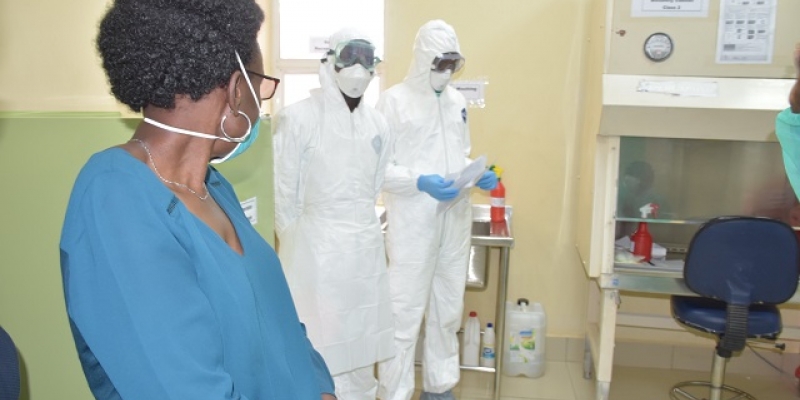
Health experts have appealed to the Government to step up checks on laboratories that conduct COVID-19 tests in the wake of inaccurate results attributed to some health facilities.
Prof. Ponsiano Kaleebu, the executive director of Uganda Virus Research Institute, said some testing facilities are not providing accurate information, which is a risk to the public.
Kaleebu wants the health ministry to consider enlisting allied health professionals like laboratory technicians, radiographers and diagnostic medical sonographers to probe this. “We need to work together to provide good services to the public and I have proposed to the health ministry to use the Allied Health Professionals Council (AHPC) to rein in laboratory operators,” Kaleebu said.
Inaccuracies of COVID-19 results, he added, not only counter efforts to manage the pandemic but also give a bad image to the country.
Kaleebu was responding to concerns raised about COVID-19 false negative results seen among domestic workers seeking employment in the United Arab Emirates. This was during a press briefi ng organised by Twaweza on COVID-19 testing at Hotel Africana in Kampala on Saturday. Laboratories are critical in identifying cases to break the chain of transmission.
Andrew Nsawotebba, a laboratory specialist and operations manager at the Entebbe COVID-19 testing centre, attributed some of the inaccuracies to health facilities that have opted to use cheaper test kits, whose results may be compromised. He urged the health ministry to regulate prices, especially on polymerase chain reaction (PCR) tests, to ensure quality.
A PCR test currently costs about sh250,000, but Nsawotebba says it can be brought down to sh180,000.
OBSERVING SOPS
A survey conducted by Twaweza in June and early July this year, has revealed that up to 90% of the people who suspect to have contracted COVID-19 visit health facilities.
It was conducted in Kampala and two border districts of Kyotera and Tororo. According to the findings, more residents in Kampala (93%), Tororo (88%) and Kyotera (87%) use sanitisers and wash hands regularly to protect themselves against contracting COVID-19. Up to 92% of the residents in the three districts also wear a face mask when out of the house. However, whereas residents were aware about social distancing as one of the SOPs meant to curb the spread of COVID-19, they did not practice it. “Some actions are understood more than they are implemented.
For example, while almost half (47%) of Kampala’s residents said people should maintain at least a two-metre distance from each other, fewer than a third of them (32%) report actually doing this. Similarly, fewer people report avoiding public gatherings and public transport,” Violet Alinda, the Twaweza Uganda country leader, said. Alinda urged the health ministry to use this data to sensitise the public on areas and practices that need improvement. Dr Susan Nabadda, the commissioner laboratory and diagnostic services at the health ministry, reassured the public of Government’s commitment towards availing test kits and vaccines.
“However, in our context, testing is not a viable measure for selfprotection. We do not have the test kits or the resources to facilitate multiple regular tests for citizens. “We, therefore, must emphasise the realistic protective measures that can be taken by all Ugandans, no matter their location or economic status. We are pleased to see high uptake of handwashing and masks and we encourage citizens to continue making use of these important measures,” Nabadda said.
Uganda currently has 849 COVID-19 patients admitted in hospitals across the country. Results of COVID-19 tests done on July 17 confirmed 460 new cases. The cumulative confirmed cases are now 89,974. Those that have recovered from the disease are 66,080. To date, a total of 2,324 people have died of the deadly virus. Those that have been vaccinated are 1,418,721, out of a target of 22 million people required to reopen the country fully.
***New Vision***
